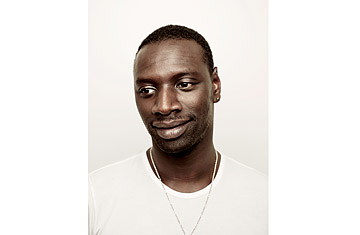
Class Act. France's breakout film star has gone from the banlieues to the big time.
(2 of 3)
Much like his character in The Intouchables, Sy crossed the class-color line thanks to one key person--in Sy's case, the well-known French-Moroccan actor Jamel Debbouze, a close childhood friend from Trappes. When Sy was 18, Debbouze began inviting him to do sketches and impersonations on a comedy show he created for Paris' Radio Nova, some of them in the slang of the banlieues, an idiom rarely heard on French airwaves in the mid-'90s. Sy built on his fame at Canal Plus television as one half of the wildly popular comedy team Omar and Fred; their two-minute sketch show is still a nightly feature of French prime time. "He was really funny, a charming, sympathetic guy," says Bernard Zekri, who worked at Canal Plus then and is now editor in chief of the French cultural magazine Les Inrockuptibles. "Sy is almost an idol among French youth," Zekri adds. "He has credibility because he comes from Trappes."
Sy lends a lot of credibility to The Intouchables, a broad farce that doesn't tinker much with its familiar buddy-movie formula. The Hollywood Reporter called it "corny, calculating and commercial," while other critics have suggested it traffics in ethnic stereotypes. In the U.S., Variety charged that Driss and Philippe's relationship is tarnished by "Uncle Tom racism"--a peculiarly American accusation to aim at a very French film but also a hint that the movie's coarse charms may not translate as easily in the States as they have in Europe. In case The Intouchables 1.0 doesn't touch a nerve in the U.S., Harvey Weinstein has also acquired the English-language-remake rights, though that version would likely be missing the original's keystone: Omar Sy. Whatever the flaws of The Intouchables, Sy's charisma leaps off the screen. With his rubbery smile and rollicking laugh, he turns Driss into an everyman hero capable of single-handedly smashing the racial divide.
The seismic popularity of The Intouchables spurred weeks of soul-searching among talking heads on French TV: Why did a slapstick romp about interracial, interclass brotherhood catch fire among the populace? Part of it was the leading man, and part of it was timing: the movie opened in November, near the kickoff of a toxic presidential campaign in which candidates continually one-upped one another with anti-immigrant rhetoric. Embattled President Nicolas Sarkozy proposed halving immigration quotas and vowed to ban halal meat from public schools. Far-right National Front candidate Marine Le Pen pinned France's financial woes in good measure on immigrants and went on to win 18% of the first-round vote. (Her father, extreme rightist and career xenophobe Jean-Marie Le Pen, saw The Intouchables as a cautionary metaphor: "France is like this handicapped person stuck in this wheelchair," he said, "and we are going to have to wait for the help of these banlieue youngsters and immigrants in general." Weinstein called his statements "repulsive.") Meanwhile, a group supporting the eventual victor, Socialist Franois Hollande, created a cheeky pro-Hollande campaign video shot partly in the banlieues and scored to Jay-Z and Kanye West's propulsive "Niggas in Paris."
